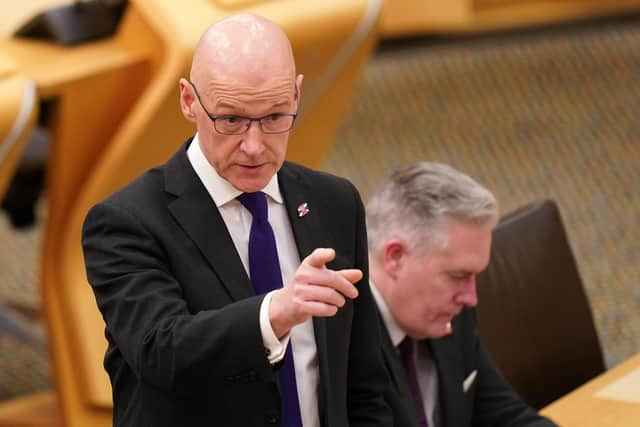Scotland could face average £10 billion in cuts per year as health costs soar to half of devolved spending
This article contains affiliate links. We may earn a small commission on items purchased through this article, but that does not affect our editorial judgement.
The commission also said health spending was set to account for half of all devolved public spending by 2072/73 due to Scotland’s ageing population and increased demands on the health service, warning of “difficult choices” for future governments.
The report, the commission’s first long-term fiscal sustainability report, outlines how Government spending will be impacted by the changes to the population and the approach to the Budget from the UK Government.
Advertisement
Hide AdAdvertisement
Hide AdIt states the Scottish Government will be faced with pushing through an average of £1.5bn a year of cuts if public services are to be continued as they are delivered today, exceeding available funding by an average of 1.7 per cent per year.


However, if the UK Government tackles its own financial sustainability problems, that gap could rise to an average of £10bn in cuts per year, or 10.1 per cent each year. This is equivalent to around a quarter of the annual spending on health in Scotland, the report states.
John Swinney, the outgoing deputy first minister and interim finance secretary, said Scotland “lacks the levers” required to fully tackle the challenges of an ageing population, adding these challenges “illustrate the necessity for Scotland to be independent”.
The report assumes the Scottish population will peak at 5.5m in 2029/30, before dropping to 5.1m by 2072/73.
Almost a third of the population (31 per cent) will be over 65 by this point, up a fifth of the population today, with children under 16 dropping to an eighth of the population, down from 17 per cent today. Scotland’s population would be ageing at a faster rate than the rest of the UK.
Due to this, health spending is set to make up half of all devolved spending by 2072/73, up from 35 per cent today, and will account for two-thirds (63 per cent) of the spending growth over the 50-year period. Total health spending is set to increase by 218 per cent over the period, tripling from £19bn in 2027/28 to £60bn in 2072/73.
Per-person spending will also rocket by 247 per cent, the report states. Social security spending is also set to almost double from £7bn to £13bn over the 50 years, with payments from new benefits such as the Scottish Child Payment rising from £600m to £1bn.
Adult social care spending will also double from £3bn to £6bn over the period.
Advertisement
Hide AdAdvertisement
Hide AdThe UK Government’s approach to spending will also have a major impact of the fiscal sustainability of the Scottish Government, the report states.
It warns of risks to overall funding should demographic pressures be stronger than in England, or if the Scottish Government continues to spend more per-person than England on policy areas linked to age.
Mr Swinney said the report was right to recognise the impact of UK Government spending decisions and the potential impact of cuts on the block grant to the Scottish exchequer.
He called on Holyrood to be given “appropriate Budget powers” to manage the Scottish Budget, adding that it was “imperative” the UK Government “recognises Scotland’s specific needs” and funds the government appropriately.
He said: “While the Scottish Government will continue to manage the public finances diligently with the powers we have, it is our view that the current constitutional settlement is insufficient to properly tackle the long-term challenges that Scotland faces.
"I believe the challenges of an ageing population illustrate the necessity for Scotland to be independent, providing the Scottish Government with full powers to manage the economy and public finances effectively and in a way that meets the needs of Scotland. Independence would also give the Scottish Government the power to design immigration policy tailored to Scotland’s needs, and return the right to free movement in the EU.”
Chair of the Scottish Fiscal Commission, Professor Graeme Roy, said: “The pressures of an ageing population and rising costs would occur under any constitutional settlement. Managing them under the current fiscal framework is a shared endeavour between both the Scottish and UK governments.
“We hope this report can support a wider and more informed conversation about the public services available for our children and grandchildren and the tax policies necessary to sustain these.”
Want to hear more from The Scotsman's politics team? Check out the latest episode of our political podcast, The Steamie.
It's available wherever you get your podcasts, including Apple Podcasts and Spotify.
Comments
Want to join the conversation? Please or to comment on this article.
